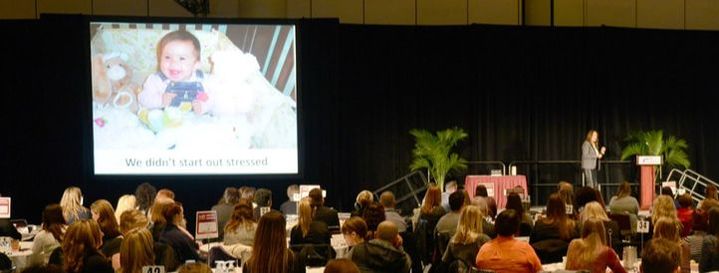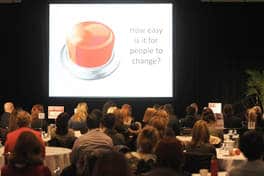1 in 5 Canadians will experience a mental health problem or illness in any given year, every year. Consider for a moment your own workplace. If 1 in 5 employees is suffering from a mental illness, what is that costing your company in lost productivity and short-term absences?
We all have a bad day every so often; the kind of day where nothing goes right or you just don’t “feel” productive. There’s nothing wrong with having a bad day. But when every day starts to be a bad day, that’s not such a good thing. And, it’s not good for business.
- 30% of all short-term and long-term disability claims are related to mental health issues
- Health expenditures are 50 per cent greater for workers who report high levels of stress, and stress-related absences cost Canadian employers about $3.5 billion each year
Because lifestyle factors are modifiable and resilience skills can be developed, the burden of workplace costs related to stress or mental health problems can be slowed or even lowered.
Leadership is about being accountable to yourself and to others. Consider the last time you flew on an airline. In the unlikely event of cabin decompression, all passengers are instructed to don their own oxygen mask before aiding the person sitting beside them, even if that person is a child. In other words, you are no good to anyone else if you are unconscious.
The same holds true for the mental health of a leader regardless of your role in the organization.
By taking care of yourself, you can take care of others. By taking care of yourself, you can influence others to do the same. By taking care of yourself, you can better lead others and make wiser decisions for the business.
- Awareness – The first step to building resiliency is becoming aware of how well you’re coping with daily stress and how this is impacting your health, quality of life and engagement at work.
- Accountability – Some of us, when our resiliency is down, notice the impact on our mental health. For many, the root cause is we’re experiencing a coping crisis. We’re not sure what to do or how to manage all the demands. To gain control we need to accept that we own our mental health and that we’re accountable to act if we don’t believe we have the skills to cope as well as we would like. This would be a commitment and desire to learn more skills so that we can better cope.
- Action – The good news is that our resiliency can evolve by developing new skills. One positive way to fuel our resiliency is to be mindful of what we do daily to fuel our total health, which includes physical, mental, work and life. Together, these pillars provide us energy. When any one pillar has a gap, such as life challenges, financial or relationship challenges, a job where we don’t feel connected, valued or psychologically safe, don’t have enough sleep, or are unaware of our cognitive hygiene, this can impact our thoughts.
- Seek out knowledge and be willing to hit the refresh button– Invest the time to learn and network with experts who can share proven strategies that deliver return on value. Interact with your peers in a safe and supportive environment so that you can gain valuable insights while avoiding unnecessary costs and frustrations. We all have busy schedules that place a high demand on our time and resources. For things to change we must be open to change, and change requires a willingness to interrupt our daily habitual patterns by hitting the refresh button!
Embrace the power of one idea! Sometimes we sabotage our own progress by making things more complicated than they need to be. The late Steve Jobs embraced the simple idea of a walk as a means to clear his head and approach challenges from a different perspective. Imagine how many ideas you can be exposed to by placing yourself (and your team) in an environment where the collective purpose is to discover ways of becoming better leaders!
|
See Dr. Bill Howatt, Stephen de Groot, Sylvia Marusyk and Keith Macpherson present live at the GoodLife Fitness Health & Wellness Leadership Summit on May 3 in Winnipeg, MB. Register today and save 30% with promotion code TWCC. Discount code available to the first 25 registrants.
Visit the website to register now or call Toll Free 1 877 348-8742 Ext. 230. |








